大学英语精读第一册unit1
- 格式:ppt
- 大小:579.50 KB
- 文档页数:83
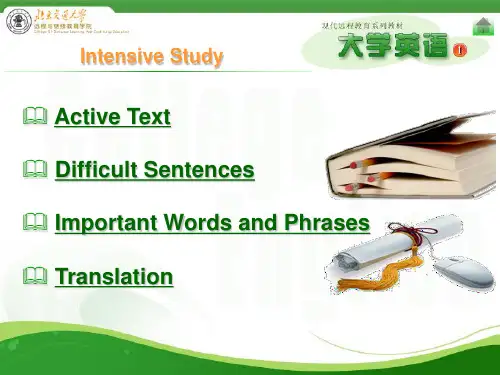
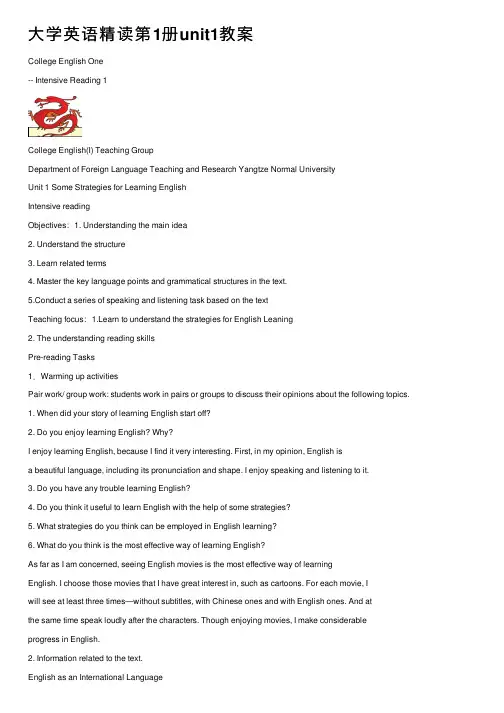
⼤学英语精读第1册unit1教案College English One-- Intensive Reading 1College English(I) Teaching GroupDepartment of Foreign Language Teaching and Research Yangtze Normal UniversityUnit 1 Some Strategies for Learning EnglishIntensive readingObjectives:1. Understanding the main idea2. Understand the structure3. Learn related terms4. Master the key language points and grammatical structures in the text.5.Conduct a series of speaking and listening task based on the textTeaching focus:1.Learn to understand the strategies for English Leaning2. The understanding reading skillsPre-reading Tasks1.Warming up activitiesPair work/ group work: students work in pairs or groups to discuss their opinions about the following topics.1. When did your story of learning English start off?2. Do you enjoy learning English? Why?I enjoy learning English, because I find it very interesting. First, in my opinion, English isa beautiful language, including its pronunciation and shape. I enjoy speaking and listening to it.3. Do you have any trouble learning English?4. Do you think it useful to learn English with the help of some strategies?5. What strategies do you think can be employed in English learning?6. What do you think is the most effective way of learning English?As far as I am concerned, seeing English movies is the most effective way of learningEnglish. I choose those movies that I have great interest in, such as cartoons. For each movie, Iwill see at least three times—without subtitles, with Chinese ones and with English ones. And atthe same time speak loudly after the characters. Though enjoying movies, I make considerable progress in English.2. Information related to the text.English as an International LanguageWorldwide over 1.4billion people live in countries where English has official status. Oneout of five of the world’s population speaks some English. Over 70% of the world’sscientists read English. About 85% of the world’s mails written in English, and 90% of allinformation in the world’s electronic retrieval systems is stored in English.Language learning strategiesLanguage learning strategies are used by learners to complete speaking, reading, vocabulary,listening and writing activities presented in language lessons. Recognizing that there is a task tocomplete or a problem to solve, language learners will use whatever strategies they possess toattend the language-learning activity.Possible language learning strategies include: using practice opportunities, self-evaluation, selective attention, time management, reviewing notes taken in class and checking one’s understanding, constantly seeking answers to questions instead of passively receiving information, etc.Active vocabulary and passive vocabularyActive vocabulary consist of the words you use frequently and comfortably in speaking and writing, while passive vocabulary consists of the words you recognize when you read and listen. Input-output balance theory in language learningInput in language learning refers to information read, seen or heard by the learner, while output refers to what the learner produces in writing and speaking. The input-output balance theory in language learning believes that one can learn a language well through maintaining abalance between input and output.English is not Real English.Skimming and scanningGlobal Reading1. Parts division of the textPart Ⅰ(Paras. 1-2) Introduce globally that while learning English is not easy, there are stillsome helpful strategies.Part Ⅱ(Paras. 3-8) Introduce six helpful strategies in detail.Part Ⅲ(Para. 9) Conclude that language learning is a process of accumulation.2. SummaryLearning English is not easy, but there are still some useful strategies that we can use to make it easier. The text introduces six strategies concerning vocabulary, idioms, listening, speaking, reading and writing, and these strategies cover the basic and important points in English learning. The text also tells us that language learning is a process of accumulation. It is worthwhile for us to take in as much as we can from reading and listening and then put them into practice through speaking and writing.3. Decide whether the following statements about the text are true or false.1) Language learners should memorize all the new words. (F)While active words demand constant practice and memorization, words that do not often occur in everyday situations require just a nodding acquaintance.2) It’s impossible to cram too many words into your head at a time.(T)3) he meaning of a word and the way native speakers use it are equally important.(T)4) Listening to English occasionally will improve your ear and speaking skills. (T)5) It’s important to catch every detail in English listening comprehension. (F)The first time one may not catch a great deal, but with each repetition one will get something more.6) Language learners do not find many opportunities to practice oral English at school.(T)4. Discourse AnalysisA strategy refers to a set of carefully planned methods for achieving something that is difficult and may take a long time. In introducing some strategies, the author adopts the structure of Problem—Strategy within a paragraph to show us the problems in English learning and then proposes strategies to solve5. What strategies do you think can be employed in English learning?Suggested Strategies:Make your own oppotunities for practice in using the language inside and outside the classroom.Specific ways:1)ask your teacher questions before, during and after class.2)speak to a foreigner3)listen to an English radio program.4)watch an English movie.5)read an English article on the Internet.6)use English software.While-reading TasksText Learning1.Explain the skill of skimming and scanning2.Ask student to skim the text to have a general idea about the text.3.Underline the difficult words and sentences and answer the questions on page 74.Expalin the text5.Ask students to sum up the good habit mentioned in the text and learn them by heart in the class./doc/441b44ebf4335a8102d276a20029bd64783e6290.html nguage points and structureNew words and expressions1. strategy: n. the act of planning and managing operations over a long period.Example: It’s a long way for our government to develop a strategy for dealing with unemployment.★tactic: n. 战术tactical: adj. 战术的strategy: n. 战略strategic: adj. 战略的Our strategy is “to pit one against ten”, while our tactic is “to pit ten against one”. 我们的战略是“以⼀当⼗”,我们的战术是“以⼗当⼀”。
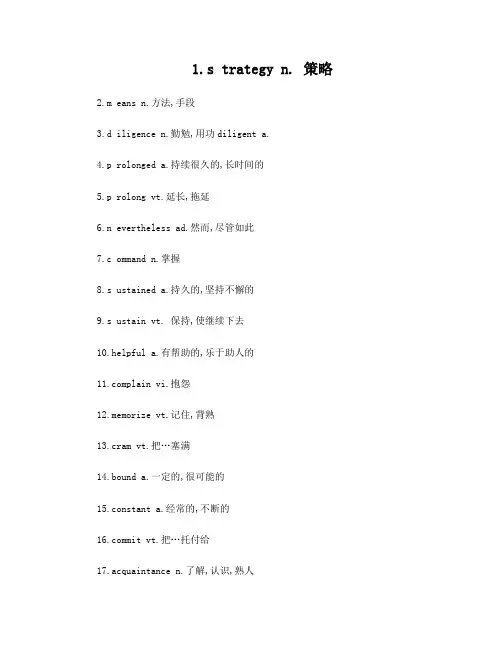
1.s trategy n. 策略2.m eans n.方法,手段3.d iligence n.勤勉,用功diligent a.4.p rolonged a.持续很久的,长时间的5.p rolong vt.延长,拖延6.n evertheless ad.然而,尽管如此7.c ommand n.掌握8.s ustained a.持久的,坚持不懈的9.s ustain vt. 保持,使继续下去10.helpful a.有帮助的,乐于助人的plain vi.抱怨12.memorize vt.记住,背熟13.cram vt.把…塞满14.bound a.一定的,很可能的15.constant a.经常的,不断的mit vt.把…托付给17.acquaintance n.了解,认识,熟人18.concentrate v.集中注意力,专心19.effective a.有效的20.route n.途径,路线21.enlarge v.扩大,放大22.vocabulary n.词汇(量)23.idiom n.习语,成语age n.惯用法25.basis n.方法,基础26.addition n.增加,加法27.repetition n.重复28.opportunity n.机会municate v.交流情况,沟通30.enjoyable a.令人愉快的31.campus n.校园32.rehearsal n.排演,预演33.partner n.同伴34.instance n.事例35.detail n.详情,细节36.purchase n.购买,购置物vt.购买37.environment n.环境38.reliable a.可靠的39.source n.来源,出处40.handle vt.处理,对付41.apart ad.相距,分开地42.assign vt.分配(任务)给某人43.motivation n.动机,动力44.motivate vt.使有动机45.culture n.文化46.summarize vt.总结,概括47.accumulation n.积累48.absorb vt.汲取,吸收by no means决不at fault有过错at a time每次be bound to肯定会commit to memory记住watch out for密切注意learn of/about得知,听说on a regular/daily/weekly basis经常、每天、每周in addition to除...之外over and over again反复seek out寻找feel free随意for instance例如in detail详细地act out将...表演出来apart from除...之外put ...into practice把...付诸实践49.determined a.下定决心的50.determine v. determination n.51.retire vi.退休52.voyage n.航海,航行53.crew n.全体船员54.steer vt.为…掌舵,驾驶55.device n.设备,装置56.gale n.大风57.previous a.以前的,过早的58.dissuade vt.劝阻59.treacherous a.暗藏危险的,奸诈的60.cape n.海角61.fortunately ad.幸运地,幸亏62.contact vt.联系,接触63.nearby ad.在附近64.following a.接着的,下列的65.waken v.唤醒,醒来66.nightmare n.噩梦67.drag vt.托,拉68.sinister a.凶恶的,邪恶的69.knight n.爵士vt.封…为爵士70.sword n.剑,刀71.accomplish vt.完成72.adventurer n.冒险家73.conquer vt.征服74.undoubtedly ad.无疑地75.moreover ad.此外,而且76.being n.生物,人77.rare a.罕见的,不常发生的78.occasion n.时刻,时机,场合79.mayor n.市长80.content a.满意的,高兴的81.primary a.最初的,首要的,根本的82.arrange vi.作安排,筹划83.minor a.较小的,次要的84.operate vi.开刀,动手术85.funeral n.葬礼86.efficient a.高效的87.decade n.十年88.endure vt.忍受,忍耐89.mint n.薄荷糖90.slipper n.拖鞋91.un seal ed a.未密封的92.parcel n.包裹93.reluctant a.不情愿的,勉强的94.flutter vi.飘动95.stoop vi.弯腰96.tremble vi.颤抖Unit 41.Worthwhile a.值得花时间的2.current a.当前的3.social a.社会的4.activity n.活动5.prohibit vt.禁止6.reasonable a.(人)讲道理的,合理的7.proposal n.提议,建议8.distract vt. 分散(思想)9.actually ad.真实地,实际上10.gap n.缺口11.divorce n.离婚12.rate n.率13.failure n.失败,失败的人14.disturb vt.打扰,使烦恼15.emotional a.感情的16.pastime n.消遣,娱乐17.sunset n.日落18.neighborhood n.临近地区,地段19.sdult n.成年人20.entertainment n.快乐,乐趣,娱乐21.typical a.典型的22.barely ad.仅仅,勉强,几乎没有23.literate a.能读写的,有文化的24.radical a.激进的25.electronic a.电子的26.involve vt.(必须)包括27.imagination n.想象力28.invent vt.发明29.illustrate vt.给…插图,举例说明30.genius n.天才31.semester n.学期32.embarrass vt.使窘迫,使尴尬33.astonish vt.惊讶34.publish vt.出版,发行,发布35.dumb a.愚蠢的,哑的36.recipe n.食谱,烹饪法37.graduate v.(大学)毕业38.minus a.低于零的,负数的prep.减去undry n.洗衣店40.ancient a.很旧的,古代的41.random n.任意,无目的行动a.任意的42.manuscript n.手稿a.手写的43.nonsense n.胡说,废话,荒谬的想法44.package n.包装袋,包,盒45.enclose vt.附上,围住46.illustration n.插图47.chapter n.章。
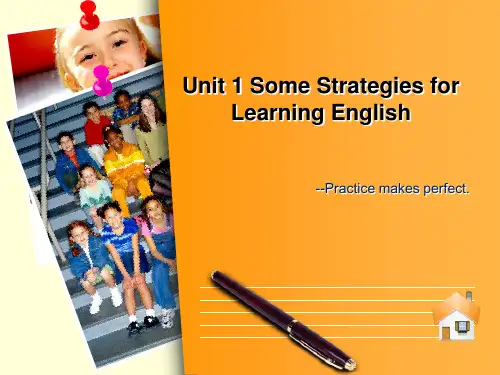
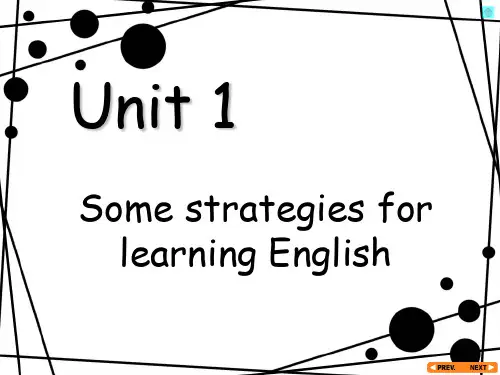

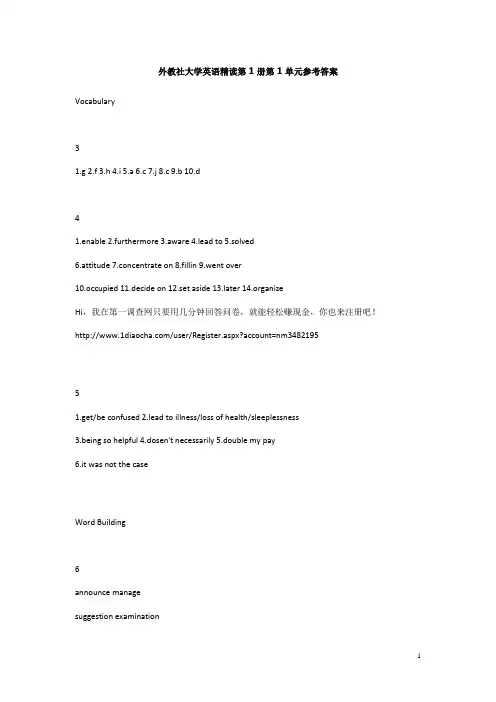
外教社大学英语精读第1册第1单元参考答案Vocabulary31.g2.f3.h4.i5.a6.c7.j8.c9.b 10.d41.enable2.furthermore3.aware4.lead to5.solved6.attitude7.concentrate on8.fillin9.went over10.occupied 11.decide on 12.set aside ter anizeHi,我在第一调查网只要用几分钟回答问卷,就能轻松赚现金,你也来注册吧!/user/Register.aspx?account=nm348219551.get/be confused2.lead to illness/loss of health/sleeplessness3.being so helpful4.dosen't necessarily5.double my pay6.it was not the caseWord Building6announce managesuggestion examinationconfuse combinedecision movementcomplete employproduction distractionorganize divideentertainment considerprotect recognizepermit exhibition71. 1)careful 2)cares 3)careless 4)care 5)carefully6)carelessness 7)carelessly 8)careful2. 1)addition 2)additional 3)add 4)additional3. 1)use 2)useless 3)use 4)useful 5)used 6)use4. 1)meaning 2)meaningful 3)means 4)comfort 5)means5. 1)comfortably 2)comfort 3)comfortable 4)comfort5)comfortable6. 1)probably 2)probability 3)probable 4)probably Structure81.so that I could read it when I was free2.so that she could receive it in the afternoon3.so that everyone could hear you4.and some eggs as well5.and plays as well6.and the United States as well7.and swims and skates as well8.give them an answer as soon as you can9.Read over the book as quickly as you can10.write home as often as he couldCloze9(A)(1)aware (2)performance (3)average (4)adequate (5)set aside(6)mentions (7)look over (8)commit (9)attitude (10)lead to(B)(1)if/one (2)about (3)it (4)know (5)up (6)as (7)from(8)words (9)into (10)other (11)for (12)whenTranslation101.His failure in the exam has made him aware of how importantit is to review his lessons regularly.2.Be sure not to forget what your parents said to you beforeyou left home.3.I'm sure her knowledge of English is adequate for the job.4.The purpose of this article is to tell the students how todevelop good study habits.5.In our age, people depend meor and more on computers tosolve various kinds of difficult problems.6.Skimming not only helps you get some ides of what you aregoing to read, but also helps you read faster and improveyour comprehension.7.Some people believe/think that boy's performance on test/in exams is always better than girls'. That is not necessarilythe case, however.8.Even students of average intelligence can become top studentsby improving their study habits.Key to Reading ActivityExercise B1.b2.d3.c4.b5.b6.a7.c8.a9.d 10.cExercise C1.蒂姆肯夫妇以一张7,000美元的支票付了学费,将女儿劳拉送进大学,以为此事就这样结束了。
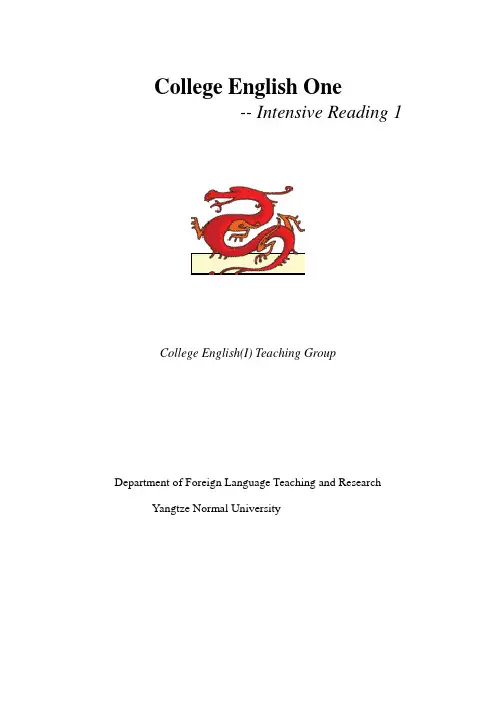
College English One-- Intensive Reading 1College English(I) Teaching GroupDepartment of Foreign Language Teaching and Research Yangtze Normal UniversityUnit 1 Some Strategies for Learning EnglishIntensive readingObjectives:1. Understanding the main idea2. Understand the structure3. Learn related terms4. Master the key language points and grammatical structures in the text.5.Conduct a series of speaking and listening task based on the textTeaching focus:1.Learn to understand the strategies for English Leaning2. The understanding reading skillsPre-reading Tasks1.Warming up activitiesPair work/ group work: students work in pairs or groups to discuss their opinions about the following topics.1. When did your story of learning English start off?2. Do you enjoy learning English? Why?I enjoy learning English, because I find it very interesting. First, in my opinion, English isa beautiful language, including its pronunciation and shape. I enjoy speaking and listening to it.3. Do you have any trouble learning English?4. Do you think it useful to learn English with the help of some strategies?5. What strategies do you think can be employed in English learning?6. What do you think is the most effective way of learning English?As far as I am concerned, seeing English movies is the most effective way of learningEnglish. I choose those movies that I have great interest in, such as cartoons. For each movie, Iwill see at least three times—without subtitles, with Chinese ones and with English ones. And atthe same time speak loudly after the characters. Though enjoying movies, I make considerableprogress in English.2. Information related to the text.English as an International LanguageWorldwide over 1.4billion people live in countries where English has official status. Oneout of five of the world’s population speaks some English. Over 70% of the world’sscientists read English. About 85% of the world’s mails written in English, and 90% of allinformation in the world’s electronic retrieval systems is stored in English.Language learning strategiesLanguage learning strategies are used by learners to complete speaking, reading, vocabulary,listening and writing activities presented in language lessons. Recognizing that there is a task tocomplete or a problem to solve, language learners will use whatever strategies they possess toattend the language-learning activity.Possible language learning strategies include: using practice opportunities, self-evaluation, selective attention, time management, reviewing notes taken in class and checking one’s understanding, constantly seeking answers to questions instead of passively receiving information, etc.Active vocabulary and passive vocabularyActive vocabulary consist of the words you use frequently and comfortably in speaking and writing, while passive vocabulary consists of the words you recognize when you read and listen. Input-output balance theory in language learningInput in language learning refers to information read, seen or heard by the learner, while output refers to what the learner produces in writing and speaking. The input-output balance theory in language learning believes that one can learn a language well through maintaining abalance between input and output.English is not Real English.Skimming and scanningGlobal Reading1. Parts division of the textPart Ⅰ(Paras. 1-2) Introduce globally that while learning English is not easy, there are stillsome helpful strategies.Part Ⅱ(Paras. 3-8) Introduce six helpful strategies in detail.Part Ⅲ(Para. 9) Conclude that language learning is a process of accumulation.2. SummaryLearning English is not easy, but there are still some useful strategies that we can use to make it easier. The text introduces six strategies concerning vocabulary, idioms, listening, speaking, reading and writing, and these strategies cover the basic and important points in English learning. The text also tells us that language learning is a process of accumulation. It is worthwhile for us to take in as much as we can from reading and listening and then put them into practice through speaking and writing.3. Decide whether the following statements about the text are true or false.1) Language learners should memorize all the new words. (F)While active words demand constant practice and memorization, words that do not often occur in everyday situations require just a nodding acquaintance.2) It’s impossible to cram too many words into your head at a time.(T)3) he meaning of a word and the way native speakers use it are equally important.(T)4) Listening to English occasionally will improve your ear and speaking skills. (T)5) It’s important to catch every detail in English listening comprehension. (F)The first time one may not catch a great deal, but with each repetition one will get something more.6) Language learners do not find many opportunities to practice oral English at school.(T)4. Discourse AnalysisA strategy refers to a set of carefully planned methods for achieving something that is difficult and may take a long time.In introducing some strategies, the author adopts the structure of Problem—Strategy within a paragraph to show us the problems in English learning and then proposes strategies to solve5. What strategies do you think can be employed in English learning?Suggested Strategies:Make your own oppotunities for practice in using the language inside and outside the classroom.Specific ways:1)ask your teacher questions before, during and after class.2)speak to a foreigner3)listen to an English radio program.4)watch an English movie.5)read an English article on the Internet.6)use English software.While-reading TasksText Learning1.Explain the skill of skimming and scanning2.Ask student to skim the text to have a general idea about the text.3.Underline the difficult words and sentences and answer the questions on page 74.Expalin the text5.Ask students to sum up the good habit mentioned in the text and learn them by heart in the class.nguage points and structureNew words and expressions1. strategy: n. the act of planning and managing operations over a long period.Example: It’s a long way for our government to develop a strategy for dealing with unemployment.★tactic: n. 战术tactical: adj. 战术的strategy: n. 战略strategic: adj. 战略的Our strategy is “to pit one against ten”, while our tactic is “to pit ten against one”. 我们的战略是“以一当十”,我们的战术是“以十当一”。
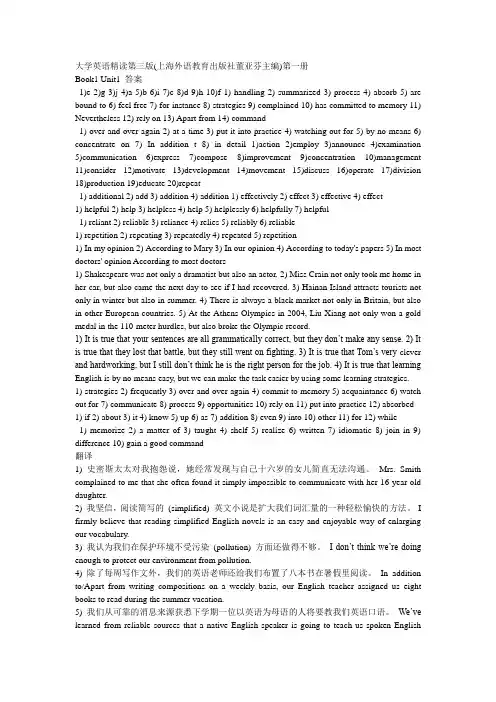
大学英语精读第三版(上海外语教育出版社董亚芬主编)第一册Book1 Unit1 答案1)e 2)g 3)j 4)a 5)b 6)i 7)c 8)d 9)h 10)f 1) handling 2) summarized 3) process 4) absorb 5) are bound to 6) feel free 7) for instance 8) strategies 9) complained 10) has committed to memory 11) Nevertheless 12) rely on 13) Apart from 14) command1) over and over again 2) at a time 3) put it into practice 4) watching out for 5) by no means 6) concentrate on 7) In addition t 8) in detail 1)action 2)employ 3)announce 4)examination 5)communication 6)express 7)compose 8)improvement 9)concentration 10)management 11)consider 12)motivate 13)development 14)movement 15)discuss 16)operate 17)division 18)production 19)educate 20)repeat1) additional 2) add 3) addition 4) addition 1) effectively 2) effect 3) effective 4) effect1) helpful 2) help 3) helpless 4) help 5) helplessly 6) helpfully 7) helpful1) reliant 2) reliable 3) reliance 4) relies 5) reliably 6) reliable1) repetition 2) repeating 3) repeatedly 4) repeated 5) repetition1) In my opinion 2) According to Mary 3) In our opinion 4) According to today's papers 5) In most doctors' opinion According to most doctors1) Shakespeare was not only a dramatist but also an actor. 2) Miss Crain not only took me home in her car, but also came the next day to see if I had recovered. 3) Hainan Island attracts tourists not only in winter but also in summer. 4) There is always a black market not only in Britain, but also in other European countries. 5) At the Athens Olympics in 2004, Liu Xiang not only won a gold medal in the 110-meter hurdles, but also broke the Olympic record.1) It is true that your sentences are all grammatically correct, but they don’t make any sense. 2) It is true that they lost that battle, but they still went on fighting. 3) It is true that Tom’s very clever and hardworking, but I still don’t think he is the right person for the job. 4) It is true that learning English is by no means easy, but we can make the task easier by using some learning strategies. 1) strategies 2) frequently 3) over and over again 4) commit to memory 5) acquaintance 6) watch out for 7) communicate 8) process 9) opportunities 10) rely on 11) put into practice 12) absorbed 1) if 2) about 3) it 4) know 5) up 6) as 7) addition 8) even 9) into 10) other 11) for 12) while1) memorize 2) a matter of 3) taught 4) shelf 5) realize 6) written 7) idiomatic 8) join in 9) difference 10) gain a good command翻译1) 史密斯太太对我抱怨说,她经常发现与自己十六岁的女儿简直无法沟通。
![大学英语精读1Unit1课后答案[整理]](https://uimg.taocdn.com/35cd2bc577eeaeaad1f34693daef5ef7ba0d1216.webp)
大学英语精读第三版(上海外语教育出版社董亚芬主编)第一册Book1 Unit1答案III.Vocabulary Activities1. 1)e 2)g 3)j 4)a 5)b 6)I 7)c 8)d 9)h 10)f2. 1) handling2) summarized3) process4) absorb5) are bound to6) feel free7) for instance8) strategies9) complained10) has committed to memory11) Nevertheless12) rely on13) Apart from14) command3. 1) over and over again2) at a time3) put it into practice4) watching out for5) by no means6) concentrate on7) In addition t8) in detailIV.Enriching Y our Word Power2.1) a) additional b) add c) addition d) addition2) a) effectively b) effect c) effective d) effect3) a) helpful b) help c) helpless d) help e) helplessly f) helpfully g) helpful4) a) reliant b) reliable c) reliance reliable d) relies e) reliably5) a) repetition b) repeating c) repeatedly d) repeated e) repetitionV. Usage1) In my opinion2) According to Mary3) In our opinion4) According to today's papers5) In most doctors' opinion / According to most doctorsVI Structure1.1) Shakespeare was not only a dramatist but also an actor.2) Miss Crain not only took me home in her car, but also came the next day to see if I had recovered.3) Hainan Island attracts tourists not only in winter but also in summer.4) There is always a black market not only in Britain, but also in other European countri es.5) At the Athens Olympics in 2004, Liu Xiang not only won a gold medal in the 110-meter hurdles, but also broke the Olympic record.2.1) It is true that your sentences are all grammatically correct, but they don’t make any sense.2) It is true that they lost that battle, but they still went on fighting.3) It is true that Tom’s very clever and hardworking, but I still don’t think he is the right person for the job.4) It is true that learning English is by no means easy, but we can make the task easier by using some learning strategies.VII. Cloze1.1) strategies2) frequently3) over and over again4) commit to memory5) acquaintance6) watch out for7) communicate8) process9) opportunities10) rely on11) put into practice12) absorbed2.1) if2) about3) it4) know5) up6) as7) addition8) even9) into10) other11) for12) whileVIII. Spot Dictation1) memorize2) a matter of3) taught4) shelf5) realize6) written7) idiomatic8) join in9) difference10) gain a good commandIX. T ranslation1) 史密斯太太对我抱怨说,她经常发现与自己十六岁的女儿简直无法沟通。
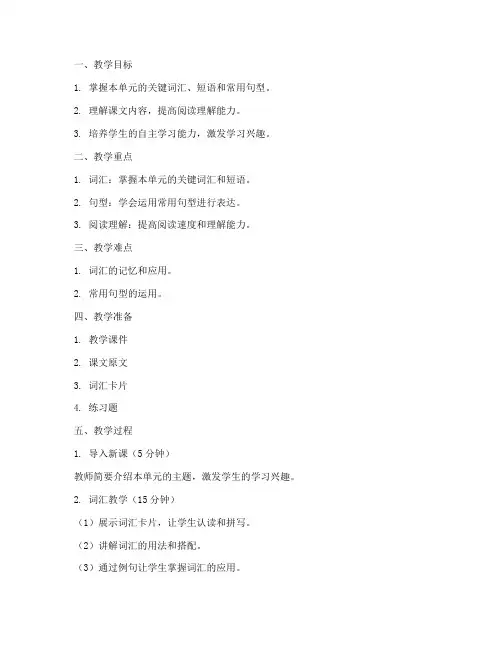
一、教学目标1. 掌握本单元的关键词汇、短语和常用句型。
2. 理解课文内容,提高阅读理解能力。
3. 培养学生的自主学习能力,激发学习兴趣。
二、教学重点1. 词汇:掌握本单元的关键词汇和短语。
2. 句型:学会运用常用句型进行表达。
3. 阅读理解:提高阅读速度和理解能力。
三、教学难点1. 词汇的记忆和应用。
2. 常用句型的运用。
四、教学准备1. 教学课件2. 课文原文3. 词汇卡片4. 练习题五、教学过程1. 导入新课(5分钟)教师简要介绍本单元的主题,激发学生的学习兴趣。
2. 词汇教学(15分钟)(1)展示词汇卡片,让学生认读和拼写。
(2)讲解词汇的用法和搭配。
(3)通过例句让学生掌握词汇的应用。
3. 句型教学(10分钟)(1)展示常用句型,让学生跟读和模仿。
(2)讲解句型的结构特点。
(3)让学生运用句型进行表达。
4. 阅读理解(20分钟)(1)让学生快速阅读课文,了解大意。
(2)教师提问,检查学生对课文的理解。
(3)分析课文中的重点段落,讲解难点。
5. 练习环节(15分钟)(1)完成课后练习题,巩固所学知识。
(2)教师讲解练习题的正确答案和解题思路。
6. 总结与作业布置(5分钟)(1)对本节课的内容进行总结。
(2)布置课后作业,让学生复习巩固所学知识。
六、教学反思1. 关注学生的学习进度,及时调整教学策略。
2. 加强对词汇和句型的讲解,提高学生的语言表达能力。
3. 注重阅读理解能力的培养,提高学生的阅读速度和理解能力。
七、课后作业1. 复习本单元的词汇和句型。
2. 阅读课文,思考课文中的重点段落。
3. 完成课后练习题。
八、教学资源1. 教学课件2. 课文原文3. 词汇卡片4. 练习题九、教学评价1. 学生对词汇和句型的掌握程度。
2. 学生阅读理解能力的提高情况。
3. 学生自主学习能力的培养。
Unit 1average: (a.)ordinarymen of average ability能力普通的人(n.)平均数An average of 10 students were absent each day.“an average of + 复数名词”作主语,谓语用复数“the average of +复数名词”作主语,谓语用单数The average of these numbers is 50.necessarily(ad.): inevitably 必定地,必要地The old do not necessarily know more than the young.未必,不一定(adj.)necessary必要的,必须的which has to be doneit’s necessary for sb. to do sth.某人有必要做某事,不能按汉语意思用“人“作主语it’s necessary + that 从句时,从句谓语用“should +动词原形”It’s necessary that he (should)buy a dictionary.Suggest that sb (should) do sth.Suggest doing sth.His expression suggests that he is tired.(=indicate)case: actual condition实情Is it the case(=Is it true) that you have lost all your money? in case: (1)如果,万一(表示条件);(2)以防,免得(表示目的)在此两种情况下,要表示将来通常用一般现在时而非一般将来时。
Take an umbrella, in case it rains.In case he comes, let me know.In case of fire, ring the bell.万一,以防in the case of至于,就….来说in any case无论如何in no case决不additional(a.): added, extraaddition(n.) in addition to 除…以外In addition to lending me his typewriter, he taught me how to use it.aside(adv.): to the side在旁边aside from除…外= apart fromAside from being fun and good exercise, swimming is a very useful skill.assignment (c. n.): sth given out as a task任务,工作He was sent abroad on a difficult assignment.执行任务(v.)assign指派某人作某事(可接双宾语,也可在直接宾语前用介词to)assign sb. sth. = assign sth. to sb.给某人分配某物The boss assigned him (to) an important task.(assign sb.(to)sth.)These rooms have been assigned to us.occupy:(1)占用,占据,充满(被占据的东西作其宾语)His books occupy a lot of space.Many cares and anxieties occupied his mind.(2)使忙于occupy oneself in doing sth( with sth.)/ be occupied in doing sth./ with sth.The newcomers were occupied in writing letters home. (adj.)occupied忙的(其前习惯上不用very 修饰,用fully, wholly, busily, solely)She is fully occupied with three small children.hobby:业余爱好(c.n.)(多指业余时间培养起来的并需一定专业只是积累的个人爱好,一般是健康的,有益的) Everyone should have a good hobby.My hobby is that I collect stamps.(false)collecting(to collect) stamps从逻辑上说,“我的爱好”应该是collecting stamps这件事情,而不是that I collect stamps(我集邮)这件事情。
大学英语精读第1册(1)UNIT 1TEXTWant to know how to improve your grades without having to spend more time studying? sounds too good to be true? Well read on...How to Improve Your Study habitsPerhaps you are an average student with average intelligence .You do well enough in school, but you probably think you will never be atop student. This is not necessarily the case, however. You can receive better grades if you want to. Yes, even students of average intelligence can be top students without additional work. Here's how:1.Plan you time carefully. Make a list of your weekly tasks. Then make a schedule or chart of your time. Fill in committed time such as eating, sleeping, meetings, classes, etc. Then decide on good, regular times for studying. Be sure to set aside enough time to complete your normal reading and work assignments. Of course, studying shouldn't occupy all of the free time on the schedule. It's important to set aside time for relaxation, hobbies, and entertainment as well. This weekly schedule may not solve all of your problems, but it will make you more aware of how you spend your time. Furthermore, it will enable you to plan your activities so that you have adequate time for both word and play.2. Find a good place to study. Choose one place for yourstudy area. It may be a desk or a chair at home or in the school library, but it should be comfortable, and it should not have distractions. When you begin to work, you should be able to concentrate on the subject.3.Skim before you read. This means looking over a passage quickly before you begin to read it more carefully. As you preview the material, you get some idea of the content and how it is organized. Later when you begin to read you will recognize less important material and you may skip some of these portions. Skimming helps double your reading speed improves your comprehension as well.4.Make good use of your time in class. Listening to what the teacher says in class means less work later. Sit where you can see and hear well. Take notes to help you remember what the teacher says.5.Study regularly. Go over your notes as soon as you can after class. Review important points mentioned in class as well as points you remain confused about. Read about these points in your textbook. If you know what the teacher will discuss the next day, skim and read that material too. This will help you understand the next class. If you review your notes and textbook regularly, the material will become more meaningful and you will remember it longer. Regular review leads to improved performance on tests.6.Develop a good attitude about tests. The purpose of a test is to show what you have learned about a subject. The world won't end if you don't pass a test, so don't worry excessively about a single test. Tests provide grades, but they also let you know what you need to spend more time studying, and they help make your new knowledge permanent.There are other techniques that might help you with your studying. Only a few have been mentioned here. You will probably discover many others after you have tried these. Talk with your classmates about their study techniques. Share with them some of the techniques you have found to be helpful. Improving your study habits will improve your grades.NEW WORDSaverage ordinary 普通的;中等的intelligence ability to learn and understand 智力necessarily inevitably 必定case what has really happened; actual condition 实情additional added 附加的,额外的addition n.weekly done or happening every week 每周的;一周一次的schedule timetable 时间表chart (sheet of paper with) information written or drawn in the form of a picture 图(表)commit 指定...用于aside to the side 在旁边;到(身)一边etc (Latin, shortened form for et cetera) and other things 等等normal usual 正常的reading the act or practice of reading 阅读assignment sth . Given out as a task (布置的)作业occupy take up 占用relaxation (sth. Done for) rest and amusement 休息,娱乐relax uhobby what one likes to do in one's free time 业余entertainment show, party, etc, that people enjoy 娱乐entertain ut.Solve find an answer to (a problem) 解决(问题)Aware having knowledge or understanding 知道的;意识到的Furthermore moreover; in addition 而且;此外Enable make (sb.) able (to do sth.) 使(某人)能(做某事)Activity sth. (to be ) done 活动Adequate as much as one needs; enough 充分的;足够的Distraction sth. That draws away the mind or attention 分心(或分散注意力)的事物Concentrate (on or upon) pay close attention (to) 全神贯注(于)Skim read quickly to get the main ideas (of) 略读Preview have a general view of (sth.) beforehand 预习Content what is written in a book ,etc. 内容Organize form into a whole 组织Later 后来;以后Skip pass over 略过Portion part; share 一部分;一份Double make or become twice as great or as many (使) 增加一倍Comprehension the act of understanding or ability to understand 理解(力)Mention speak or write about (sth.) in a few words 提及Confuse a standard book for the study of a subject 教科书;课本Performance achievement 成绩Meaningful having important meaning or value 富有意义的Attitude what one thinks about sth. 态度,看法Purpose aim 目的,意图Excessively too much 过多的,过分地ExcessivePermanent lasting for a long time; never changing 持久的;永久的Technique way of doing sth. 技巧,方法Helpful useful; providing help or willing to help 有益的;给予帮助的,肯帮忙的PHRASES EXPRESSIONSFill in write in 填写,填充Decide on make a choice or decision about 选定,决定Set aside save for a special purples 留出As well also; too; in addition 也,还;同样Be aware (of) know (sth.) ;know (what is happening) 知道,意识到Concentrate on direct one's attention, efforts, etc. to 全神贯注于Look over examine (quickly) 把...看一遍,过目Go over review 复习Lead to result in 导致NOTES1 This text is adapted (改编) from Lado English Series, Book 6.2 This is not necessarily the case, however: But this is notinevitably (必然地)Other examples:He thought he had found the right answer, but that was not the case.-IS it true that Mary is leaving tomorrow morning?-No, that's not the case.3 Fill in committed time such as eating..."Committed time" is the time during which a person feels it necessary to do certain things.4 ...plan your activities so that you have adequate time for both work and play."SO that" is used here to introduce an adverbial clause of purpose (目的状语从句).Other examples:Prof. Smith spoke slowly at first so that we could follow him easily.I got up very early this morning so that I could catch the first bus to town.STUDY PRACTLCEWords to DrillAdequate attitude average aware caseCommit concentrate confuse double enableFurthermore helpful later mention necessarilyOccupy organize performance purpose skimSolveReading Aloud and Memorizing1 Read the following paragraph (段)until you learn it by heart, paying special attention to sense groups (意群) and the sentence stress (句重音):`Plan your `time `carefully. //`Make a `list of your `weekly `tasks. //`Then/`make a `schedule or `chart of your `time. //`Fill `in com `mitted `time/such as `eating,/`sleeping,/ `meetings, /`classes, et` c .// `Then/ de` cide on `good ,`regular `times for `studying. //Be `sure to `set a`side e`nough `time/to com`plete your `normal `reading/and `work as`signments. //Of `course, /`studying `shouldn't `occupy `all of the `free `time/ on the `schedule. //It's im`portant / to `set a`side `time `for rela`sation, /`hobbies,/and enter`tainment as `well. //`This `weekly `schedule/may `not `solve `all of your `problems, /but it will `make you `more a `ware of `how you `spend your `time.//`Further `more. it will e`nable you /to`plan your ac`tivities/so that you have `adequate `time/for `both`work and `play.COMPREHENSION OF THE Text2 Answer the following questions:1.Do you think an average student will never become a top student?2.Why is it important to plan your time carefully?3.Do you spend all your free time studying? If not, what other things do you do in your spare time?4.Where do you usually study in the evening? In your bedroom , in your classroom or in the library? Why?5.What does skimming mean? Why is it important?6.How can you make good use of your time in class?7.Do you think it helpful to take notes while listening to your teacher? Why or why not?8.DO you think it necessary to write down everything that the teacher says? What kind of information do you write down?9.What should you do after class? Why is it important to review your lessons regularly?10.What is the purpose of a test?11.Which of the six suggestions (建议) in the text do you find the most helpful to you? Give your reasons.12.Have you any other suggestions to offer to your classmates?Vocabulary (词汇)3 Choose the definition (定义) from Column (栏) B that best matches (匹配) each italicized (斜体的) word or phrase (短语) in Column A:A B1. an average student a. find an answer to2. not necessarily the case b. talked about in a few words3. set aside enough time c. enough4. occupy all of your free time d. unclear in one's mind5. solve all of your problems e. put together in an orderly way6. have adequate time for work f. true7. skim before you read g. ordinary8. how it is organized h. save for a special purpose9. mentioned in class i. Take up10. remain confused about the points j. look over quickly4 Fill the blanks (空格) with the words or expressions given below. Change the form where necessary.Occupy solve concentrate on enable laterFurthermore aware go over attitude organizeSet aside decide on fill in lead to1. This new technique will ______ them to double their production.2. Fresh vegetables are nutritious (有营养的) ;_____ , they are cheaper than frozen ones.3. It was several minutes before I became _____ of what was happening in the classroom.4. Too much discussion will only __________ confusion.5. He made a careful study of the problem and _______ it within two days.6. He realized that his ________ on these matters was wrong.7. I can't ________ what I am doing because it is so noisy here.8. Would you please ________ your name . address and telephone number here?9. She ________ the plans again and discovered three mistakes.10. His time is fully ________ by his job as manager.11. Let's but our heads together and a plan of action.12. I've decided to ________ ten yuan each month so that I can buy a used bike next year.13. At first he decided to move to Chicago, but _______ he changed his mind.14. I tried to ______ my thoughts before speaking out on the question.5 Complete the following sentences, using the words giver in brackets (括号) :Model: If we... our word, we'll make mistakes.(concentrate)If we don't concentrate on our work, we'll make mistakes.1. If you try to learn too many things at a time, you may...(confuse)2. Too much work and too little rest may...(lead)3. Thank you for... with my homework.(helpful)4. Food that looks good...taste good.(necessarily)5. The manager promised to... if I could win the contract for him.(double)6. I was angry when I discovered... and that she'd been telling me lies.(case)Word Building6 The suffixes (后缀) -ment, -ation, -sion, and-ion are used to form nouns (名词) from verbs, e.g.assignment <- assign relaxation <- relaxintroduction <- introduce comprehension <- comprehend concentration <- concentrate7 Study the following words. Then use them correctly in the sentences below.Verbs Nouns Adjectives (形容词) Adverbs(副词)Care care careful carefullyCarelessness careless carelesslyAdd addition additionalUse use usefulUselessUsedMean meaning meaningfulMeaninglessComfort comfort comfortable comfortablyProbability probable probably1. care (u.) ,care (n.) ,carelessness,careful,careless,carefully,carelessly1 You must be very ________not to say anything to Paul.2 She ______ for the old man as if he were her own father.3 A ______ driver is a danger to us all.4 All the children here are taken good ______ of.5 If Bob drove more ______ , he wouldn't have so many accidents.6 He is not a diligent (勤奋的) student. He shows great ______in everything he does.7 Spend more time on your work, Tom. You did your homework very ______ .8 I hope you will be more ______ in future about what you say.2. add, addition, additional1 In ______ to English, you'd better learn another foreign language.2 Mother needs ______ help in the kitchen on weekends when all of us come home from school.3 The fire is going out (熄灭) ;will you ______ some wood?4 This is an ______ proof (证据)of his carelessness.3. use (u.) ,use (n.) useful, useless, used1 Prof. Wang tells us to make good ______ of our time in class.2 My bicycle is broken (坏了); it is completely.3 May I ______ your English dictionary for an hour or two?4 This is a very ______ dictionary for beginners of English.5 It's much cheaper to buy a ______ car than a new one.6 What's the ______ of crying?4. mean meaning meaningful meaningless1 Could you explain the ______ of the title (题目)to me?2 The more you read the poem (诗),the more ______ you will find it to be.3 As Lenin says, forgetting the past _______ betrayal(背叛).4 It's a waste of time doing such ______ work.5 To him, life ______ struggle.5. comfort (u.) comfort (n.) comfortable comfortably1 You can sit very ______ in this new car.2 I tried to ______ her; but shat could I say?3 Sit down, please, and make yourself ______ .4 Young people should not seek ______ and enjoyment and shirk(逃避) hardship.5 Tom didn't feel _______ living with his parents.6. probability probable probably1 If you go to the park early in the morning, you will ______ find the old artist taking a walk there.2 In all ______ he will go with you to the museum.3 It is ______ that the cost will be greater than we think.4 Jack is ______the best student in his class.Structure (结构)8 Complete the following sentences , using so that, and... as well or as ... as one can:1. I took an English book with me (以便有空可以读一下).2. He posted the letter early in the morning (为的是让她下午能收到).3. Would you speak a little louder (好让每个人都听得见)?4. We'd better get some milk, some bread,(再弄一些鸡蛋).5. He is a versatile (多才多艺的) writer. He writes poems, novels,(还有剧本).6. Last year he visited Japan, Canada,(还有美国).7. He plays basketball and football,(他还游泳场滑冰(skate)).8. You should(尽早给他们一个答复).9. (请尽快把这本书看完). I have to return it to the library tomorrow after noon.10. When he left his parents he promised them that he would(尽量多写家信).Cloze(完形填空)9 Fill in the missing (缺掉的) words:(A)The purpose of this passage is to make students a ______(1) of the importance of developing good study habits in improving their p _______(2) on tests. Directed at the a ____(3) student , the article first stresses(强调) the need to plan one's time, so that an a ____(4) amount of time is s____ a____(5) for study. It also m ___(6) that the place in which one chooses to study should be free of distractions. In the matter of study techniques, the writer advises students to ___ l_____ o_____(7 ) their lessons quickly before careful reading, a practice which other writers have called "pre-reading"; to use class time wisely; to c_______(8) regularly scheduled time to study; and to approach(对待) tests with a good a ____(9). Following the advice given in this article could l____ t______(10) improved grades formany students.(B)Many of you are studying English and you may be wonderingwhy it is so difficult to learn. It is actually not that difficult to learn ______(1) you know some basic facts (2) the language and culture that ______(3) reflects(反映).Perhaps the first thing you need to k_____ (4) about English is that it made ____ (5) of several other languages such _____(6) French, German, Latin, Greek and Anglo=Saxon. In addition, there are words ______(7) Spanish in English and many American Indian words and names; even some Chinese and Japanese _____ (8) have found their way ______(9) the English language. This borrowing of words from o ___(10) languages is one of the key reasons _____ (11) some of the difficulties that people meet with ______ (12) they are learning English.Translation10 Translate the following sentences into English:1他这次考试失败使他意识到定期复习功课是多么重要。
UNIT 1TEXTWant to know how to improve your grades without having to spend more time studying? Sounds too good to be true? Well, read on...How to Improve Your Study HabitsTerhaps you are an average student with average intelligence. You do well enough in school, but you probably think you will never be a top student. This is not necessarily the case, however. You can receive better grades if you want to. Yes, even students of average intelligence can be top students without additional work. Here's how:1. Plan your time carefully. Make a list of your weekly tasks. Then make a schedule or chart of your time. Fill in committed time such as eating, sleeping, meetings, classes, etc. Then decide on good, regular times for studying. Be sure to set aside enough time to complete your normal reading and work assignments. Of course, studying shouldn't occupy all of the free time on the schedule. It's important to set aside time for relaxation, hobbies, and entertainment as well. This weekly schedule may not solve all of your problems, but it will make you more aware of how you spend your time. Furthermore, it will enable you to plan your activities so that you have adequate time for both work and play.2. Find a good place to study. Choose one place for your study area. It may be a desk or a chair at home or in the school library, but it should be comfortable, and it should not have distractions. When you begin to work, you should be able to concentrate on the subject.3. Skim before you read. This means looking over a passage quickly before you begin to read it more carefully. As you preview the material, you get some idea of the content and how it is organized. Later when you begin to read you will recognize less important material and you may skip some of these portions. Skimming helps double your reading speed and improves your comprehension as well.4. Make good use of your time in class. Listening to what the teacher says in class means less work later. Sit where you can see and hear well. Take notes to help you remember what the teacher says.5. Study regularly. Go over your notes as soon as you can after class. Review important points mentioned in class as well as points you remain confused about. Read about these points in your textbook. If you know what the teacher will discuss the next day, skim and read that material too. This will help you understand the next class. If you review your notes and textbook regularly, the material will become more meaningful and you will remember it longer. Regular review leads to improved performance on test.6. Develop a good attitude about tests. The purpose of a test is to show what you have learned about a subject. The world won't end if you don't pass a test, so don't worry excessively about a single test. Tests provide grades, but they also let you know what you need to spend more time studying, and they help make your knowledge permanent.There are other techniques that might help you with your studying. Only a few have beenmentioned here. You will probably discover many others after you have tried these. Talk with your classmates about their study techniques. Share with them some of the techniques you have found to be helpful. Improving your study habits will improve your grades.NEW WORDSaveragen. ordinary 普通的;中等的intelligencen. ability to learn and understand 智力necessarilyad. inevitably 必定casen. what has really happened; actual condition 实情additionala. added 附加的,额外的n. additionweeklya. done or happening every week 每周的;一周一次的schedulen. timetable 时间表chartn. (sheet of paper with) information written or drawn in the form of a picture 图(表)commitvt. 指定...用于asidead. to the side在旁边;到(向)一边etc(Latin, shortened form for et cetera) and other things等等normala. usual正常的readingn. the act or practice of reading阅读assignmentn. sth. given out as a task(布置的)作业occupyn. take up占用relaxationn. (sth. done for) rest and amusement休息,娱乐relaxv.hobbyn. what one likes to do in one's free time业余爱好entertainmentn. show, party, etc. that people enjoy娱乐entertainvt.solvevt. find an answer to (a problem)解决(问题)awarea. having knowledge or understanding知道的;意识到的furthermoread. moreover; in addition而且;此外enablevt. make (sb.) able (to do sth.)使(某人)能(做某事)activityn. sth. (to be) done 活动adequatea. as much as one needs; enough充分的;足够的distractionn. sth. that draws away the mind or attention分心(或分散注意力)的事物concentrate (on or upon)vi. pay close attention (to)全神贯注(于)skimvt. read quickly to get the main ideas (of)略读previewvt. have a general view of (sth.) beforehand预习contentn. what is written in a book, etc.内容organizevt. form into a whole组织laterad. 后来;以后skipvt. pass over略过portionn. part; share一部分;一份doublev. make or become twice as great or as many(使)增加一倍comprehensionn. the act of understanding or ability to understand理解(力)mentionvt. speak or write about (sth.) in a few words提及confuseda. mixed up in one's mind迷惑的,混淆的confusevt.textbookn. a standard book for the study of a subject教科书;课本performancen. achievement成绩meaningfula. having important meaning or value富有意义的attituden. what one thinks about sth.态度,看法purposen. aim目的,意图excessivelyad. too much过多地,过分地excessivea.permanenta. lasting for a long time; never changing持久的;永久的techniquen. way of doing sth.技巧,方法helpfula. useful; providing help or wiling to help有益的;给予帮助的,肯帮忙的PHRASES & EXPRSSIONSfill inwrite in填写,填充decide onmake a choice or decision about选定,决定set asidesave for a special purpose留出as wellalso; too; in addition也,还;同样be aware (of)know (sth.); know (what is happening)知道,意识到concentrate ondirect one's attention, efforts, etc. to全神贯注于look overexamine (quickly)把...看一遍,过目go overreview 复习lead toresult in 导致。